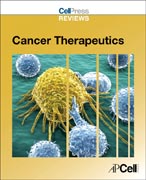
Cell Press Reviews: Cancer Therapeutics provides an overview of key recent advances and open research questions in cancer treatment. With articles written by leading researchers in the field, this publication offers the most up-to-date insights into how genetics influences treatment decisions and how the immune system can be employed to battle cancer, and describes the current state of the art in drug discovery and targeted treatments. Contributors to this compilation include many prominent researchers in the field, such as: . Daniel A. Haber, Director, Massachusetts General Hospital Cancer Center; Professor, Harvard Medical School . Tony Kouzarides, Professor, University of Cambridge; Deputy Director, Wellcome Trust/Cancer Research UK Gurdon Institute; founder, Chroma Therapeutics . Charles L. Sawyers, Chair, Human Oncology and Pathogenesis Program, Memorial Sloan Kettering Cancer Center; President, American Association for Cancer Research; member, National Cancer Advisory Board; recipient, 2013 Breakthrough Prize in Life Sciences Cell Press Reviews: Cancer Therapeutics will assist both experts and those new to the field in understanding the current state and future direction of cancer therapy. This publication is part of the Cell Press Reviews series, which brings together topical review articles recently published in Cell Press journals, including the Trends in. series. These compilations are curated by Cell Press journal editors and offer comprehensive updates from leaders in the field on the most cutting-edge and important scientific questions. . Provides timely, comprehensive articles on a wide range of topics in cancer therapeutics . Offers insight from experts on genetic, molecular, and cellular aspects of cancer therapy. Features reviews on basic science advances translated into drug discovery and therapeutic approaches. Includes articles originally published in Cell, Cancer Cell, Trends in Genetics, Trends in Molecular Medicine, and Trends in Pharmacological Sciences INDICE: 1) The evolving war on cancer; Daniel A. Haber, Nathanael S. Gray and Jose Baselga; Cell 2) Can we deconstruct cancer, one patient at a time? C. Anthony Blau and Effie Liakopoulou; Trends in Genetics 3) The genetic basis for cancer treatment decisions; Janet E. Dancey, Philippe L. Bedard, Nicole Onetto and Thomas J. Hudson; Cell 4) Cancer epigenetics: From mechanism to therapy; Mark A. Dawson and Tony Kouzarides; Cell 5) Converting cancer therapies into cures: Lessons from infectious diseases; Michael S. Glickman and Charles L. Sawyers; Cell 6) Antibody-based immunotherapy of cancer; Louis M. Weiner, Joseph C. Murray and Casey W. Shuptrine; Cell 7) Macrophage Regulation of Tumor Responses to Anticancer Therapies; Michele De Palma and Claire E. Lewis; Cancer Cell 8) Recombinant viral vaccines for cancer; Ryan Cawood, Thomas Hills, Suet Ling Wong, Aliaa A. Alamoudi, Storm Beadle, Kerry D. Fisher and Leonard W. Seymour; Trends in Molecular Medicine 9) Dynamics of targeted cancer therapy; Ivana Bozic, Benjamin Allen and Martin A. Nowak; Trends in Molecular Medicine 10) Targeting protein-protein interactions as an anticancer strategy; Andrei A. Ivanov, Fadlo R. Khuri and Haian Fu; Trends in Pharmacological Sciences 11) Targeting the RAS pathway in melanoma; Zhenyu Ji, Keith T. Flaherty and Hensin Tsao; Trends in Molecular Medicine 12) Targeting tumor cell motility as a strategy against invasion and metastasis; Alan Wells, Jelena Grahovac, Sarah Wheeler, Bo Ma and Douglas Lauffenburger; Trends in Pharmacological Sciences 13) The Valley of Death in anticancer drug development: a reassessment; David J. Adams; Trends in Pharmacological Sciences 14) Metformin and cancer: from the old medicine cabinet to pharmacological pitfalls and prospects; Arian Emami Riedmaier, Pascale Fisel, Anne T. Nies, Elke Schaeffeler and Matthias Schwab; Trends in Pharmacological Sciences 15) Curing APL through PML/RARA degradation by As2O3; Valerie Lallemand-Breitenbach, Jun Zhu, Zhu Chen and Hugues de Thé; Trends in Molecular Medicine 16) A snapshot of chemoresistance to PARP inhibitors; Alberto Chiarugi; Trends in Pharmacological Sciences
- ISBN: 978-0-12-420192-7
- Editorial: AP Cell
- Encuadernacion: Rústica
- Páginas: 322
- Fecha Publicación: 20/12/2013
- Nº Volúmenes: 1
- Idioma: Inglés
